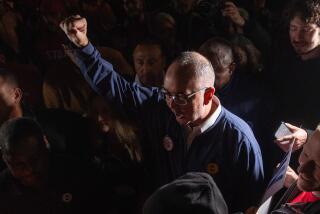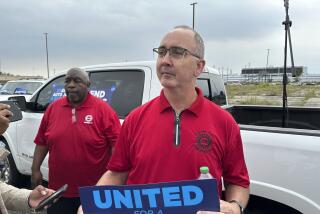Retiree Care Becoming Key Coal Industry Issue : Labor: Firms say their contributions to the trusts that fund the coverage hurt their competitiveness. Still, the trusts operate in the red, union points out.
- Share via
HUNTINGTON, W.Va. — The coal industry’s top labor negotiator plans to make retiree health care expenses a key issue in next year’s contract talks between coal operators and the United Mine Workers union.
The two trust funds that pay the medical benefits are operating in the red, and coal companies that contribute to the funds say it’s harder to compete against firms that don’t have to pay.
“Every company with union operations knows that retiree health benefits is the single most non-competitive cost,” Michael K. Reilly said last week after he was elected chairman of the Bituminous Coal Operators Assn.
Without relief, the UMW jobs and the benefit trust funds are imperiled, said Reilly, president of Zeigler Coal Co. of Fairview, Ill..
The association’s contract with the UMW, known as the National Bituminous Coal Wage Agreement, expires in February, 1993. The contract negotiated by the association’s 14 members sets the industry standard.
Coal operators want changes in the court-ordered system that forces about 300 companies to pitch in $3.25 for each man-hour worked by a union member.
Despite those contributions, the trust funds are in precarious financial condition, according to the latest financial report released by the UMW Health and Retirement Funds.
As of June 30, 1990, liabilities exceeded assets by $84.7 million at the 1950s benefit trust, which pays benefits to UMW members who retired before 1974. The trust was $45.2 million in the red the year before, according to the UMW.
For the other trust, which pays benefits to workers who retired after 1974 and whose last employer is no longer in business, liabilities exceeded assets by $23.3 million as of June 30, 1990.
Employers provide regular group insurance for the remaining retirees.
Meanwhile, there are fewer employees at contributing companies, meaning there is less income for the funds.
Operators say companies that contribute to the funds must seek higher prices for their coal, putting them at a competitive disadvantage.
A variety of other factors have contributed to a decline in coal companies’ business, according to industry experts. Whatever the cause, the effect is fewer employees whose labor helps support the funds.
Companies in the bituminous coal operators agreement employ about 48,000 UMW members, 5,000 fewer than last year.
“UMWA employment and production has seen a sharp and unexpected decline over the past few months,” Reilly said.
“Increasing contribution rates, causing reduced output, (and) forcing ever-higher rates is a death spiral for UMWA jobs and the retiree health benefit trusts,” he said.
Retiree health care was at the center of the UMW’s 1989 strike against Pittston Co., which wanted to end its contributions to the benefit trust funds. The union won its demand that Pittston continue its contributions, while the company won the ability to operate its mines seven days a week.
More to Read
Inside the business of entertainment
The Wide Shot brings you news, analysis and insights on everything from streaming wars to production — and what it all means for the future.
You may occasionally receive promotional content from the Los Angeles Times.










